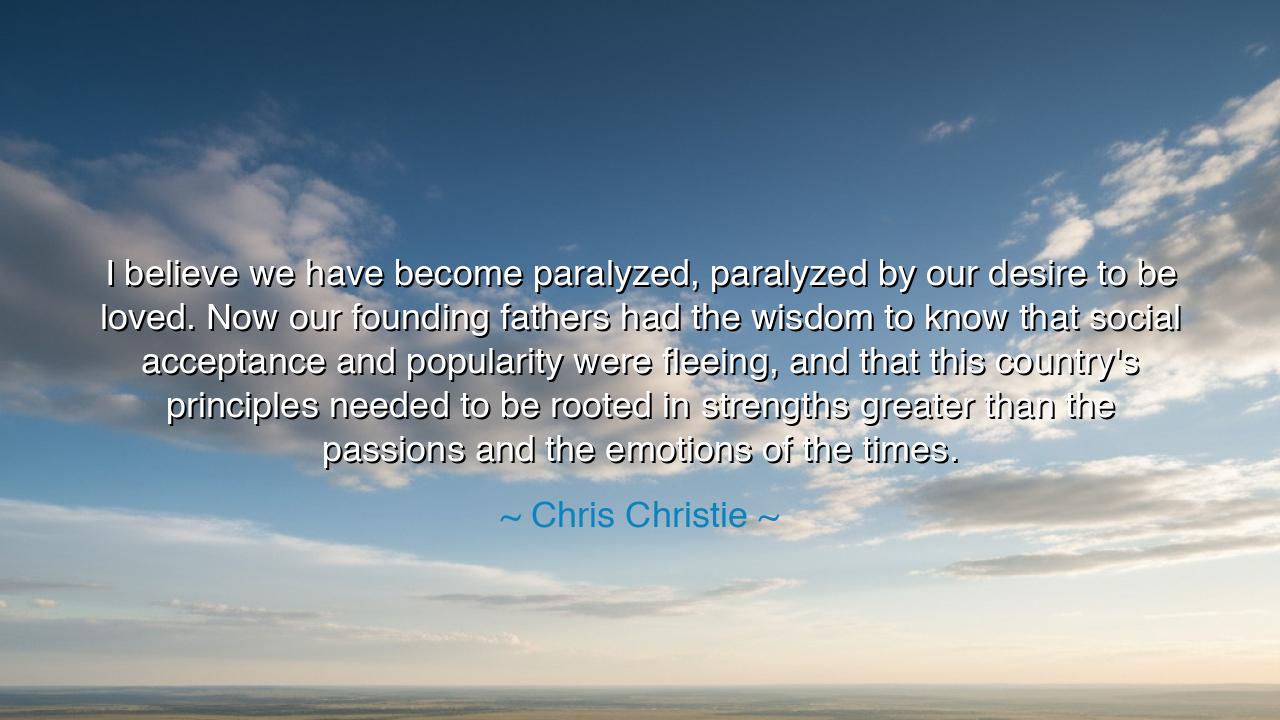
I believe we have become paralyzed, paralyzed by our desire to
I believe we have become paralyzed, paralyzed by our desire to be loved. Now our founding fathers had the wisdom to know that social acceptance and popularity were fleeing, and that this country's principles needed to be rooted in strengths greater than the passions and the emotions of the times.






Chris Christie, with the voice of warning, once declared: “I believe we have become paralyzed, paralyzed by our desire to be loved. Now our founding fathers had the wisdom to know that social acceptance and popularity were fleeing, and that this country’s principles needed to be rooted in strengths greater than the passions and the emotions of the times.” In these words lies a call to courage, for the pursuit of popularity has always been a chain that weakens the will of leaders. True strength, Christie reminds us, is not found in the fleeting approval of the crowd, but in the eternal foundation of principle.
The ancients knew this truth. To be enslaved by the desire for love and acceptance is to build upon shifting sands. A man who seeks only to please the multitude becomes a leaf driven by the storm, tossed in every direction by the emotions of the times. But the wise rulers of old—like Solon of Athens or Cincinnatus of Rome—built upon virtue, justice, and discipline, knowing that the clamor of the people may rise and fall, but truth endures.
Christie points to the founding fathers, who with foresight and resolve, crafted a republic not to satisfy every whim of the populace, but to endure through the tempests of history. They knew that popularity is as fleeting as smoke, while liberty and justice are pillars that must stand even when the winds of opinion rage against them. Their wisdom was not in pleasing their age, but in shaping a framework for generations yet unborn.
Consider the story of Abraham Lincoln, who during the Civil War was reviled by many, mocked in papers, even despised by his own party. Yet he did not bend to the hunger for approval. He pursued the higher path—preserving the Union and ending slavery. In his own time he was not adored, but history crowns him with honor because he chose principle over popularity. Here is the living proof of Christie’s warning and counsel.
Let the generations remember: to be paralyzed by desire for love is to forsake true leadership. Better to be hated for truth than adored for falsehood. For nations, like men, must be built on foundations stronger than applause. The task of every age is the same—to resist the narcotic of acceptance, and to hold fast to the enduring light of principle. This is the legacy of the fathers, the courage of the great, and the charge for all who would lead.






-8Nguyen Duong Am - 8/1
There’s a certain nostalgia in this reflection, as if we’ve lost something essential in our collective character. I can’t help but agree that the desire to please has paralyzed not just individuals but entire institutions. Yet, it makes me question whether seeking love and validation is entirely negative. Couldn’t that same desire, when rooted in empathy, motivate unity rather than conformity?
Bbaobao334
I appreciate the historical perspective here. Christie seems to suggest that the founders understood the danger of emotional politics, which feels incredibly relevant today. But I’d like to ask—can we ever truly separate principles from passion? The founding ideals themselves were born out of intense emotion and conviction. Maybe the real challenge is channeling emotion without letting it dictate the moral compass.
Lle
This quote hits hard because it calls out a very human weakness—the need for approval. I wonder, though, is this desire uniquely modern, or has it always existed but just found louder outlets today? Maybe technology has amplified something that’s always been part of human nature. Still, it’s sobering to think that a nation’s moral backbone could be weakened by the pursuit of being liked.
VHVU HOAN
Christie’s words make me think about how politics has shifted from statesmanship to performance. The desire to be liked or ‘go viral’ seems to dominate public discourse. But can a democracy thrive if leaders fear unpopularity more than being wrong? Perhaps the founders understood something timeless: that stability comes not from emotional consensus, but from anchoring values that outlast the mood of the moment.
TDLe tien dung
I think this idea has a lot of truth to it. There’s a deep irony in how a society that values freedom also seems enslaved to public opinion. But it raises a question—how do we balance empathy and principle? Wanting to be loved isn’t inherently bad, but when it becomes the goal rather than the byproduct of integrity, we risk losing moral clarity.